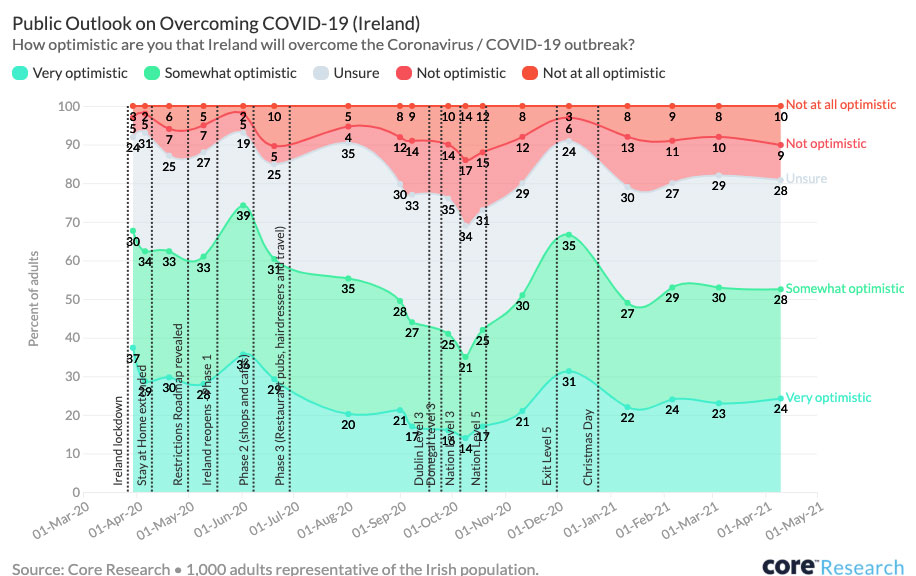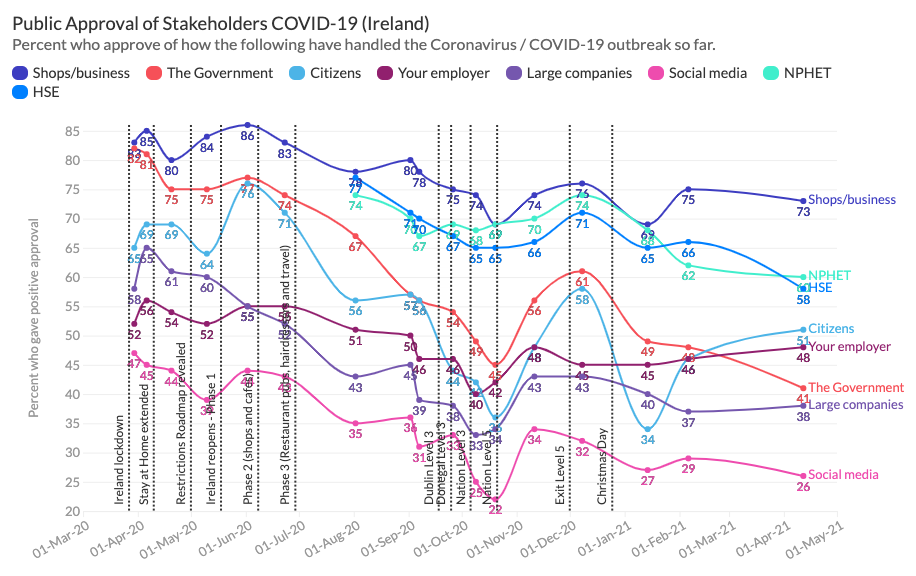
Since it started tracking the impact the pandemic was having on Irish society last year, Core Research has unearthed some fascinating insights into how Irish people have been coping with the pandemic and how brands can respond. Now, 400 days later, Finian Murphy reflects on the past year and the hope we have for the future.
Today, Friday 23rd April marks 400 days since Core Research began to study the impact of the pandemic on every aspect of our lives.
Since then, we have spoken with 16,000 people about the effects of COVID-19 – from job losses, to more time with family, from loneliness to finding love online. Based on this survey data, we have made predictions about future behaviours, understood mobility, consumer sentiment and consumer behaviours – some that may stick in a post-Corona world.
A key theme to reflect on as we look towards the end of this horrendous period in history is social cohesion. This is the extent of connectedness and solidarity among different groups in society. It will be central to the country moving forward, and addressing challenges such as high unemployment, the housing problem and the climate crisis.
In June 2020, we were “all in it together,” when 76% of the population approved of how other citizen’s were handling the pandemic. This high level of social cohesion crashed in January 2021, when only 34% approved of how other citizens behaved over Christmas. This fracture in our relationship with each other has healed somewhat, but today, half the population trust that other people are doing their best to overcome the pandemic, while half the population do not.

As we plan for an exit, it will be important to acknowledge this division and for community, political and organisational leaders to repair this gap. In the latest Consumer Mindset report, Core Research look at the different levels of optimism and sentiment within the population. You can download this report at onecore.ie.
Hope prevails.
The flowers are blooming, the evenings getting longer and the vaccines are rolling out. After a long period of public perseverance, the nation is beginning to see signs of hope.
As people watch Instagram videos of friends in the UK enjoying an outdoor beer or getting a haircut, there is a sense that we are on the last leg of a long road. However, with continued levels of debate in the past month about mandatory hotel quarantine, the vaccine roll-out and what age groups should be prioritised, public sentiment remains flat in terms of short-term optimism.
While the KBC Consumer Sentiment Index (conducted by Core Research) has yet to return to the pre-COVID-19 level (85.2), it has bounced back to 77.1 in March 2021, and we predict this may increase again for the month of April.
This is an indication that most consumers are generally confident about their finances in the next 12 months, but what about their mood in the next three months? More specifically, which groups are optimistic and who are not?

Core’s COVID-19 tracker reveals that public concern about the pandemic has declined since January, in line with case numbers, however, caution still remains high, with 51% of adults saying they are very or extremely concerned.
Generational divide
Over the past three months, the percentage of all adults who are optimistic about overcoming COVID-19 has not changed – 52% are optimistic – with the remainder unsure about the months ahead.
This uncertainty does not impact all equally. The older generation who are beginning to be vaccinated or see friends and family receiving the jab, are more likely to feel optimistic (63% of over 55 year olds). In contrast, 53% of under 35 year olds are not optimistic. The younger generation see their friends abroad out socialising and are unsure about when they will be able to do so.
This uncertainty about the short-term future matched with high youth (15-24 year olds) unemployment which is now at 59.2% is causing significant pessimism amongst the next generation. This gap in confidence and hope between the young and old will need to be acknowledged to ensure that social cohesion remains, as the country recovers.
Brands and organisations that demonstrate empathy and provide solutions or offerings to the younger generation who are most impacted by COVID-19 (particularly women), have the opportunity to create life-long relationships with the next generation of customers.
Finian Murphy is marketing director of Core. To read the full report click HERE





















